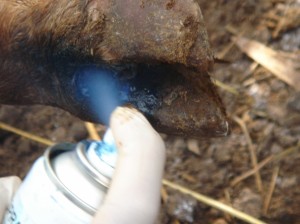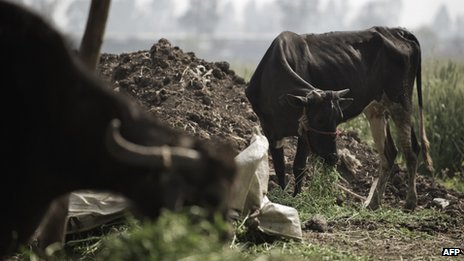By Tom Westcott
Tripoli, 13 July:
Foot and Mouth Disease (FMD) remains at large in northern Libya, with further outbreaks recorded by the . . .[restrict]World Animal Health Organisation (OIE).
Glaieul Mamaghani, Acting Head of the Communication Unit for the World Organisation for Animal Health (OIE) told Libya Herald the FMD situation was: “ongoing with three new outbreaks reported in the north of the country on the coast.”
The report, submitted by Dr Taher Ahmad Matouk, the Chief Veterinary Officer at Libya’s National Centre of the Animal Health and Breeding Improvement, identified two new outbreaks in Benghazi and one in Tripoli. Of these, 41 cases were in cattle and 100 in sheep and goats. No animal deaths have been reported in the most recent outbreaks, although this year over one thousand livestock have died as a result of FMD.
Mamaghani said: “Control measures are still in place including quarantine, disinfection of infected premises and treatment of affected animals with antibiotics.” She continued: “Antibiotic treatment reported by Libyan authorities can be chosen when lesions due to FMD pose a risk of infection or are infected.”
She was unable to comment on Libya’s choice of control measures . She said however, that the steps being taken, which include a topically-applied antibiotic spray, are standard treatment for the disease.

There are seven strains of FMD worldwide, three of which have now been identified in Libya. OIE records show that Sterotypes O and A are considered endemic Then in February, a third strain known as SAT2 (first seen in Libya in 2003) re-appeared on farms between Benghazi and Ajdabiyah, SAT2 has also struck widely in Egypt.
While it is extremely rare for humans to contract it,
FMD is a severe and extremely contagious viral disease among cloven-footed animals Its symptoms include fever and blisters around and inside the mouth and between the hooves.
It is not usually fatal in adult animals, with just two to five percent mortality. Deaths mainly occur in young animals. However, the treatment of infected beasts with antibiotics is costly. The virus can attack any cloven-footed animal, including camels. These last however, only exhibit mild symptoms and cannot pass it to each other.
Dr Matouk has been responsible for submitting monthly reports to the OIE since 2009. Several attempts by Libya Herald to contact Dr Matouk on the number the OIE holds for him, were unsuccessful. [/restrict]






